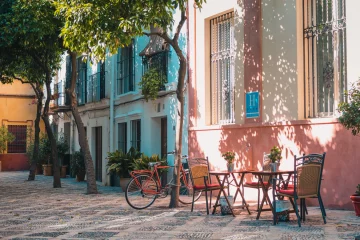Table of Contents
The country of Greece
The country of Greece is a paradise for tourists who are interested in Art, culture and literature. Far away from the beach bum, an amazing country for the lover of the classics.
Greece is located in southeastern Europe, bordered by Albania, Turkey, Bulgaria and the Former Yugoslav Republic of Macedonia. Greece, which constitutes the Balkan Peninsula, is surrounded by thousands of little islands, in which less than 200 are inhabited. Greece is a mountainous country, with a major peak at over 1,500m above sea level.
Greece is perhaps one of the more ancient countries in Europe. Antiquity of Greece dates back to 3000 BC when the powerful Cycladic, Minoan and Mycenaean civilisations flourished. Greece’s evolution of powerful city-states, especially Athens and Sparta, in the years 800 and 500 BC produced the classical age of Athens which was the most high point of the Grecian civilisation.
The peninsula of Peloponnesu
The peninsula of Peloponnesus, southern part of Greece, is known both for its picturesque scenery and its history, and is made up of numerous regions that each region have their own histories, cultures and appearances. The cities of Mycenae and Corinth are very nice places to have a walk.
The islands in Greece
The islands in Greece are very important and renowned as Mykonos, Crete and Rhodes. Santorini is a quite impressive island, its capital Thira is at the edge of its large cliff, due a volcanic eruption thousands of years ago. One of the most impresionant things to do is enjoy its Sunsets! Santorini also has fabulous black sand beaches, like Perissa Beach. Another island to visit is Mykonos, a very funny island, 20 sandy beaches to enjoy the sun, the climate and the views, for its house architecture. The sacred island of Delos, which is a short boat ride from Mykonos, is a nice place to relax. logy.
When to go to Greece
The climate in Greece is characteristic of the Mediterranean climate: mild and rainy winters, relatively warm and dry summers and, generally, extended periods of sunshine throughout most of the year. A great diversity of climate subtypes, always within the Mediterranean climate frame, are encountered in several regions of Greece. This is due to the influence of topography (great mountain chains along the central part and other mountainous bodies) on the air masses coming from the moisture sources of the central Mediterranean Sea. Thus the weather in Greece varies from the dry climate of Athens and East Greece in general, to the wet climate of Northern and Western Greece.
In climatological conditions, the year can be approximately subdivided into two main seasons: The cold and rainy period lasting from mid-October until the end of March, and the warm and dry season lasting from April until September.
Transports in Greece
Greece is a comfortable place to get around, because Greece has a huge system of local transport consisting of ferries, air travel, buses and trains for travel between towns and more local transport choices within a town or an island. You can travel to almost any location via public transport.
Buses are the support of land transport, with a network that reaches out to the smallest villages. The trains are a good option. To most tourists, though, traveling in Greece means island-hopping on the multitude of ferries that crisscross the Adriatic and the Aegean. If you’re in a hurry, Greece also has an extensive domestic air network.
Eating in Greece
Greeks love their food as much as anyone. The exclusive tastes of Greece assure that you are in for several culinary surprises during your stay in the country. Greek cuisine is popular throughout the world for its good quality products and the amazing taste of its food. Contrary to common belief, you will discover that Greek cuisine is not only moussaka, souvlaki and horiatiki salata, but has a wide diversity of dishes that can meet the culinary demands of both meat-eaters and vegetarians in an extremely satisfying way. Nevertheless, there are restaurants and taverns all over the country that offer, not appropriate Greek cuisine, but dishes and tastes from all over the world. Some dishes are the same everywhere in Greece and the Greek Islands, while some others are local culinary specialties or same dishes cooked in diverse manners (in islands, Crete, Thessaloniki, etc).
Greek Cuisine
Greek cuisine is a mixture of foreign influences and home-grown traditions. Nearby Italy and Turkey have left a major impact on Greek cuisine, and there are shared dishes with both of these nations, as well as a plethura of Greek originated dishes. The traditional Greek diet is very Mediterranean, adopting vegetables, herbs, and grains native to the Mediterranean biome.
Being a highly maritime nation, the Greeks incorporate plenty of seafood into their diet. The country is also a major producer and consumer of lamb; beef, pork, and especially chicken are also popular. Olive oil is a staple in Greek cooking, and lemon and tomato paste are common ingredients. Bread and wine are always served at the dinner table.
Festivals in Greece
A Greek festival is a tradition of culture and entertainment where you will taste the Greek food, Greek music, Greek culture, Greek dancing and great family fun. Furthermore, and depending on local arrangements there are raffles and shopping for Greek, jewelry, books, music, spices, etc. Several places also organize running races and other outdoor activities. A Greek Festival is an event that you should not miss! And do not worry, even if you can’t dance syrtaki or hasapiko you will still feel at home!
Greece has several festivals that have been known from ancient times. Today, the Festivals in Greece have a religious core and are in agreement with the Orthodox calendar. The Orthodox calendar is similar to the Catholic calendar except for Easter. Greek Festivals are usually organized by the local communities of Greek Orthodox Churches. A Greek Orthodox Church, beyond a place of religious worship, is habitually the center of cultural activities of the local Greek community.
Greek Food
There is normally a committee of volunteers within the community that is formed particularly for the purpose of organizing the Greek Festival. This directive labor acquires months of preparation and nearing the days of the Greek Festival many more volunteers are mobilized. The highly noted in these festival days are the numerous ladies (and often gentlemen) who are known in the community for their discipline and skill in cooking traditional Greek food. This is why the food at Greek Festivals has a distinct home made taste and presentation. Many of these volunteer cooks often use recipes that have their origin to their grand-grand parents and are characteristic of particular geographic origins in Greece.



0 comentarios